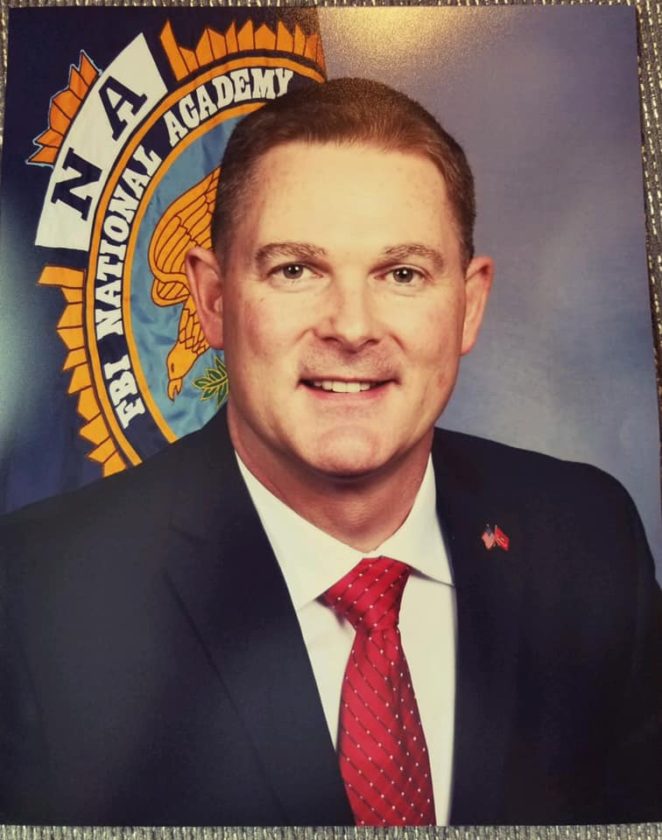
BY JOHN SNYDER
OF PASCACK PRESS
HILLSDALE, N.J.—Police Capt. Sean Smith had tradition—and his officers’ mental and physical wellness—much in mind as he graduated the 275th FBI National Academy in Quantico, Virginia on March 15.
At the program, he followed in the footsteps, set in 1975, of Hillsdale Police Lt. Vincent McCarthy and of his own father, Thomas, a retired Tenafly police captain.
The FBI National Academy is a professional 10-week course of study held four times a year for American and international law enforcement managers nominated by their agency heads.
According to the FBI National Academy, Smith was one of 251 law enforcement officers from 47 states, Washington, D.C., 26 nations, five military organizations, and five federal civilian organizations to make it through the program this session.
On average, the officers have 21 years of law enforcement experience and usually return to their agencies to serve in executive-level positions.
The program’s classroom experiences, organized through the University of Virginia, provides guest speakers and coursework in intelligence theory, terrorism and terrorist mindsets, management science, law, behavioral science, law enforcement communication, and forensic science.
It also includes a physical fitness component worthy of the Marines who helped design it.
The program stands in the service of improving the administration of justice in police departments and agencies to raise law enforcement standards, knowledge, and cooperation worldwide.
Nearby but separate is the FBI Training Academy, where all new agents are required to attend a 20-week training session.
Taking the long view
Sean Smith, a former United States Marine Corps machine gunner who had served in Operation Restore Hope—which helped create a secure environment for humanitarian efforts in Somalia in the early 1990s—joined the Hillsdale Police Department in 1997.
He rose—is rising—quickly through the ranks: he was promoted to sergeant in 2012, made lieutenant in 2014, and put on his captain’s bars in 2015.

Of the FBI National Academy, Smith told Pascack Press April 2, “It’s a real eye-opening experience. Once you get out of your comfort zone of where you work and live it’s whole different world out there.”
He said the experience was arduous but in his view not grueling. The more important focus, he said, was that it convinced him of the need to do more at the department level to help ensure physical, emotional, and mental wellness and resiliency for police.
He said he’s working to institute a wellness policy for the department whereby officers would check in with a psychologist once a year “and talk about the stresses of the job, if they choose to do that.”
He also has his sights set on a more rigorous physical fitness program for the department.
“Officer wellness has reached a critical stage nationally where police suicides have trumped officer shootings,” he said, taking in departments large and small.
He suggested officers are Type-A folks who are taught to go out into dangerous and ugly situations, witnessing, interceding in, and absorbing physical and emotional trauma—including involving children—that most citizens can’t truly imagine.
“How do you process these critical incidents and carry on? Although we don a uniform and a badge we’re all human and we suffer from human vulnerabilities,” he said.
Fathers and sons
Smith said his father, who graduated in the program’s 100th class while his mid-30s, was there to see him graduate—a moment Thomas Smith was unable to share with his own father, when it was his time.
“They were so honored by his presence they mentioned his name in the class speech. I’m proud that my dad was there to see me graduate,” Sean Smith said.
(For its part, the Tenafly Police Department warmly congratulated Sean Smith on his graduation over its social accounts.)
He showed he cherishes a newspaper account of his father’s graduation from the program. Now he’s part of the story of the FBI National Academy as well, and is eager to add to and leverage its networking benefits
“I now have—and the Hillsdale Police Department has—resources throughout the world. I now have a database of the FBI National Academy Associates [based at the FBI Academy], so if there’s ever a critical incident where I need to get in touch…I can get right to the source,” he said.
“A lot of cyberattacks are coming from overseas [including] Russia. In many cases we can’t extradite these [suspects]. We have to work with our international partners in law enforcement,” he added.
Follow the Yellow Brick Road
At the academy’s website, graduates recall (and fondly so, the site says) their experience on the “Yellow Brick Road,” the final test of the fitness challenge: a 6.1-mile run through a hilly wooded trail built by the Marines.
“Along the way, the participants must climb over walls, run through creeks, jump through simulated windows, scale rock faces with ropes, crawl under barbed wire in muddy water, maneuver across a cargo net, and more,” the Academy says.
“I loved it. It felt like I was back home [in the Marines],” Smith told Pascack Press.
For greater professionalism
The program began July 29, 1935 in response to a 1930 study that recommended the standardization and professionalization of law enforcement departments across the U.S. through centralized training.
With strong support from the International Association of Chiefs of Police and with the authority of Congress and the Department of Justice, the FBI Police Training School was born.
Courses at that time included scientific aids in crime detection, preparation of reports, criminal investigation techniques, and administration and organization. With the advent of World War II, courses were added in espionage and sabotage.
Nominations are open to officers with a minimum rank of lieutenant or the equivalent and who are approved by their respective field office.
- Candidates must be a regular, full-time officer of a duly constituted law enforcement agency of a municipality, county, or state, having at least five years of substantial and continuous experience;
- Be at least 25 years old;
- Be in excellent physical condition, capable of strenuous exertion and regular participation in the use of firearms, physical training, and defensive tactics, which will be confirmed by a thorough physical examination (submitted when requested by the FBI) by a medical doctor of the nominee’s choosing and at the nominee’s expense;
- Possess an excellent character and enjoy a reputation for professional integrity;
- Exhibit an interest in law enforcement as a public service, a seriousness of purpose, qualities of leadership and enjoy the confidence and respect of fellow officers;
- Have a high school diploma or high school equivalency certificate; and
- Agree to remain in law enforcement for a minimum of three years after graduating from the FBI National Academy.
